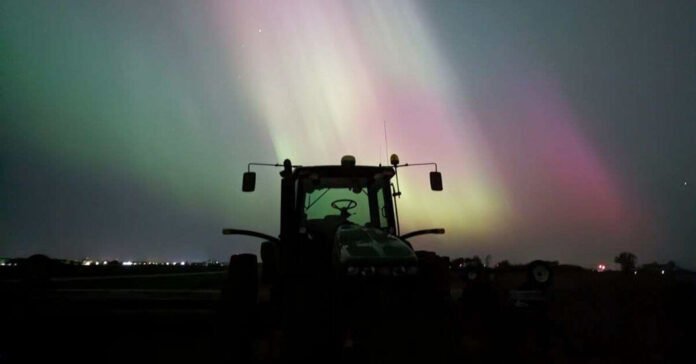[ad_1]
The powerful geomagnetic storm that cast the northern lights’ vivid colors across the Northern Hemisphere over the weekend also caused some navigational systems in tractors and other farming equipment to break down at the height of planting season, suppliers and farmers said.
Many farmers have come to rely on the equipment, which uses GPS and other navigational technology and helps them to plant more efficiently and precisely by keeping rows straight and avoiding gaps or overlap. But over the weekend, some of those operations in the Midwest, as well as in other parts of the United States and Canada, temporarily ground to a halt.
In Minnesota, some farmers who had planned to spend Friday night sowing seeds were hamstrung by the outages. “I’ve never dealt with anything like this,” said Patrick O’Connor, the owner of a farm about 80 miles south of Minneapolis that mainly grows corn and soybean.
Mr. O’Connor said that after being rained out for two weeks, he got into his tractor around 5 p.m., hoping to spend the night planting corn. When he received a warning about his GPS system, he called a technical help line and was directed to a message saying there was an outage and nothing could be done to fix it.
In Nebraska, another farmer told 404 Media an online publication covering technology, that his operations had been shut down. “All the tractors are sitting at the ends of the field right now shut down because of the solar storm,” said the farmer, Kevin Kenney. “No GPS,” he added. “We’re right in the middle of corn planting.”
Solar storms are caused by violent expulsions of charged particles from the sun’s surface. When directed toward Earth the material can interact with our planet’s magnetic field, resulting in a geomagnetic storm. The event this weekend was the strongest solar storm to reach Earth since October 2003.
Farm equipment suppliers had warned that the storm would result in disruptions. And on Saturday, Landmark Implement, which sells John Deere farming equipment across parts of the Midwest, said that the accuracy of some of its systems had been “extremely compromised” because of the event.
The company said in a statement that it was searching for a “tool to help predict this in the future so that we can attempt to give our customers an alert that this issue may be coming.” It described the storm as a “historic event” rather than something it would have to “continue to battle frequently.”
Terry Griffin, an associate professor in agricultural economics at Kansas State University, said that while infrequent, such storms still posed a threat to farming in the United States, where the majority of crops are planted using modern guidance systems.
“This was the first time we’ve had geomagnetic storms that were so strong, and we were reliant upon GPS,” he said, noting that among the worst times for a storm like this to occur was during the planting season, when precision is crucial. Alternative technologies, including systems that use machine vision and artificial intelligence, or a more localized navigation system that would not collapse in a solar storm, are being developed, Dr. Griffin added.
Mr. O’Connor, the Minnesota farmer, said that the outage had made him realize how reliant he was on a technology often taken for granted, and that if it stopped working again in the future, and for a longer period, he may have to “find ways to make do without.”
On Friday evening, instead of planting corn, Mr. O’Connor said he prepared a different field for planting, all while taking in the “phenomenal” colors of the sky. “It interrupted my evening, but I still was in the field,” he added.
“I was able to see the Northern Lights in all their glory.”
[ad_2]
Source link

